Movie licenses: solid gold or fools gold?
With Dirty Harry the next game to get the movie to game treatment, we ask: what's the point of basing videogames on movie licenses, and the pros and cons surrounding their increasing use...
In simple terms, buying the right movie license for your game is the accepted publisher shortcut to the retail shelves and instant media attention. But the problem for any aspiring videogames publisher is how does it know for sure which of the crop of upcoming releases are going to be hits two - or more - years before the movie hits the theatres?
Solid gold doesn't come cheap
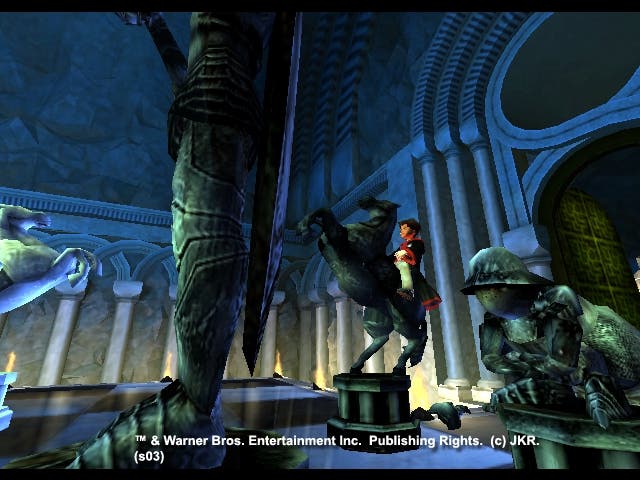
Even if you do happen to acquire a solid gold license such as The Matrix, The Terminator, Harry Potter or Lord Of The Rings, there's still the enormously problematic issue of physically getting the game(s) on the shelves on time. Most licenses come with huge strings attached, effectively forcing publishers to release the game on a particular date, or else incur huge financial penalties. In these circumstances, designing, developing and marketing the game in the face of ludicrous deadlines nearly always results in an unsatisfying end product.
Publishers do their best, of course. It's not as if they enjoy making bad games or set out to. Sure, they want to make money - this is a business, after all - but to accuse publishers of deliberately trying to rip off consumers with sub standard product is wide of the mark. Why would a company knowingly peddle games it knows are not good? Their reputation depends upon it.
In the event of a less than brilliant movie conversion, they generally hope to shield unfinished games from the critical eye of the hardcore critics; in the worst cases withholding playable code until the very last moment in the hope that it will miss print magazine's monthly deadlines. It's tantamount to mass deception, but that's the way it goes sometimes when there's a lot riding on it. Enter The Matrix, for example, was withheld until after its release date, with exceptionally strict preview coverage guidelines. As it turned out it sold well and divided critics almost down the middle, but one thing's for sure - if it wasn't a licensed game it would have been held back for another few month's development.
Already been done
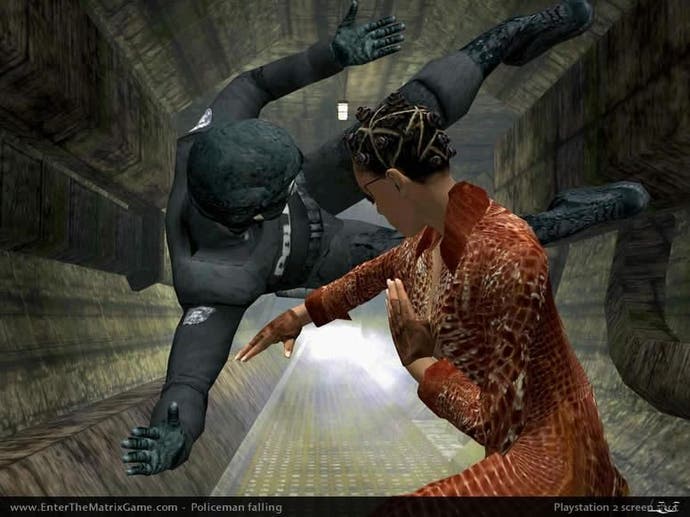
So what's the answer? In the case of forthcoming movies there's not much more than isn't being done already - simply work with the film partner as early on in the project as possible, and gain as close access as you can to the artists, actors and the script. If the game's still not any good (Terminator 3: Rise Of The Machines springs instantly to mind), you're probably best off either re-negotiating the deal to give the project some chance of being polished up, or else bite the bullet and learn the lessons for next time - if there is a next time and you've not crippled the company.
The best thing, short of just making sure the developer's talented enough from the beginning to turn out a decent game, do what Starbreeze managed to do with The Chronicle Of Riddick and actually discard the events of the film altogether. Make it a companion to the movie, a prequel, or set in the same 'universe'. One of Enter The Matrix's best ideas was to set the game in a parallel timeline to the movie, and famously included footage not in the movie that retold the events of secondary tier characters that only briefly appeared in the movie. But even that idea didn't work quite as well as some might have hoped - how many people were disappointed with not being able to play as the game's main stars? The argument was that Neo was "too powerful", but seriously, you don't buy a Bond game to play as Q, (oh, hang on) so why should ETM have been any different?
The over-riding point, though, is that shoehorning game designs into different segments of a movie rarely makes for a cohesive or convincing gaming experience - far better to design the game from the ground up with events that relate to the character that fundamentally works as a game rather than some piss poor facsimile of "the chase sequence", "the shoot out" and all the gaming clichés we've seen a thousand times.
Sub game central
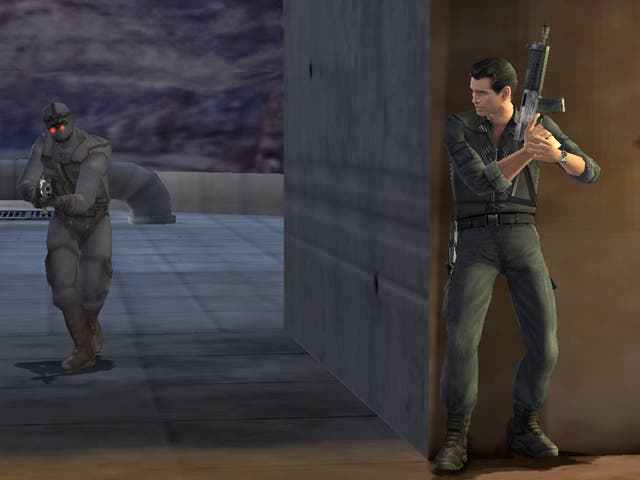
Some developers have tried to overcome repetition by cramming a movie game with as many sub genres as possible, like some crazy gaming pot pourri, but again, far better to make sure the game you're designing is simply good at what it does, than having half baked sections that may look good on a press release fact sheet, but in reality turn into tedious sub sections that you can’t wait to get past. The Bond titles are overly guilty of trying to be all things to all people, but still, seven years on we're still stroking our copy of GoldenEye - for many the pinnacle of film to game achievements. But why did GoldenEye work and yet Everything Or Nothing end up a bit of a muddle? Again, because the core mechanic in the former was so strong and consistent throughout. EoN had its moments, but more often that not frustrated with one off sequences. Look at a title like Halo - the game which Bungie admits is "30 seconds of fun repeated over and over". It's essentially the principle most great games are built on, however cleverly they disguise this fact with different scenery, enemies and upping the odds.
Another great approach rarely used was Probe's forgotten PSone classic Die Hard Trilogy, which simply took three unrelated sequences from all the movies and stitched them together into a relentlessly entertaining experience. It hardly mattered which bit of which move you were playing in, it was just a lot of fun. The genius of that design was that it was effectively three games in one, allowing you to play each section as you saw fit. None of this 'here's the stealth bit', 'now the driving bit', 'now the first person section' approach. We're not saying the latter approach is necessarily flawed in itself, but jack of all trade games tend to end up being watered down approximations of the real thing - and who wants that?
The really obvious thing to do, which most publishers have started to realise is to make games based on older movies. The classics that never go out of style and have such a memorable cast that you're only limited by your imagination as to what to do with them. In that sense you're not only guaranteed to know how popular they are from the very beginning of the project, but don't have to suffer the ridiculous seven month deadline hell that some studios are forced into when tasked with certain licensed-based projects. Think Harry Potter, think 007 Racing, think again. EA certainly did with its first Lord Of The Rings game, delaying it by a whole year in order to do the brand justice, even if it meant missing out on the Fellowship feast.
Old gold
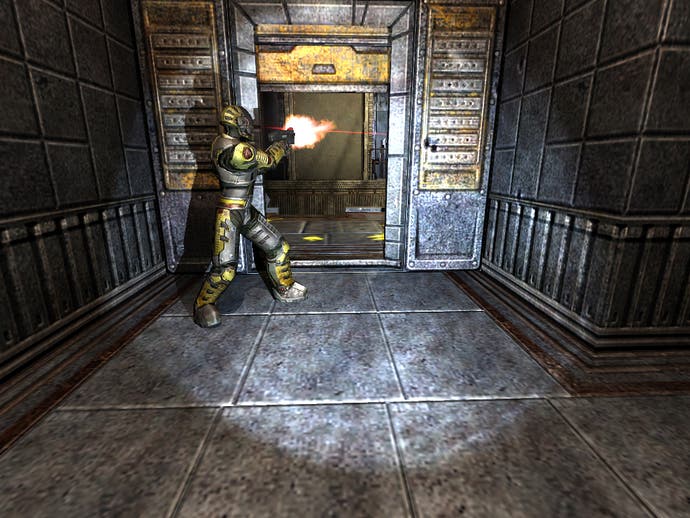
By plucking the older movies out as gaming projects, you're not only minimising the risk in terms of the public response (you know they’re hits already), but you can effectively take as long as you like to make sure the game's absolutely ready when it hits the shelves. Pick a forgotten cult classic, and the chances are the license terms will be a damned sight cheaper than whatever Warners is demanding for Potter, or New Line is for The Lord Of The Rings.
Some movie studios may smell money and set the bar too high, or you may end up battling against creative controllers who find the idea of a videogame version of their movie abhorrent. No-one said it was gong to be easy, but it's surely got to be a better starting point for a videogame than trying to pitch to a studio for a sure fire hit that ends up a total flop.
The issue of original IP comes to mind equally strongly: many of the very best games made in the last four years have been totally ignored by apathetic retailers, unimaginative marketeers, and ultimately an uneducated audience. By and large, the public buy by recognition, as sad a fact as that is. It doesn't matter if Prince Of Persia, Beyond Good And Evil and XIII were superior to the other products on sale last Christmas. The cold hard fact to the investors in the business is that these games do not perform as well commercially as licensed product. It breaks our heart every time, but it's becoming virtually impossible for all but about one in 100 (or more) new gaming IPs to become mass market hits.
Attention grabber
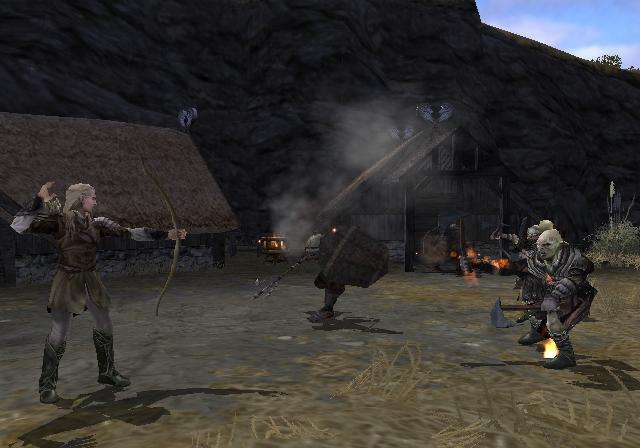
If we accept that as a fact (however undesirable that is), then surely the next best thing is for gaming manufacturers to make good, intelligent use of the properties out there? The right license grabs attention immediately; gets retailers on side, the marketing team know what to do with it, while even the press get excited when it's an intelligent use of a property. At worst they maintain a healthy level of scepticism, but at least the title has our attention. If there's anything worse than being talked about, it’s not being talked about.
So what properties readily spring to mind as a potential movie to game transition? It's been done before, but a Rambo-based jungle shooter would be ripe for the picking. Blade Runner worked well in the dying days of the point and click era, but could be superbly rendered as a more dynamically evolving futuristic narrative based action adventure. It's not a movie, but the premise of 24 opens up enormous opportunities for game developers, while obscure horror titles like Project Zero and Clock Tower in the context of a well renowned horror franchise would instantly gain far more attention while potentially maintaining their design integrity.
In Memoriam was a superbly innovative online detective adventure that precisely two people bought. Placed in the context of a murder mystery movie such as Seven or the Hannibal series it would generate massive critical and commercial attention.
The list goes on and will be the subject of a further feature looking closer at which movies would work, and how, but the point is there's a world of opportunity for game publishers to consider this area as rich pickings for game development. Like screenplays and novels sit successfully alongside movies, games could quite comfortably nestle alongside their movie counterparts. Not as a replacement or re-enactment of the movie experience, but as an ally and complementary product to broaden the entertainment on offer from the brand overall.

